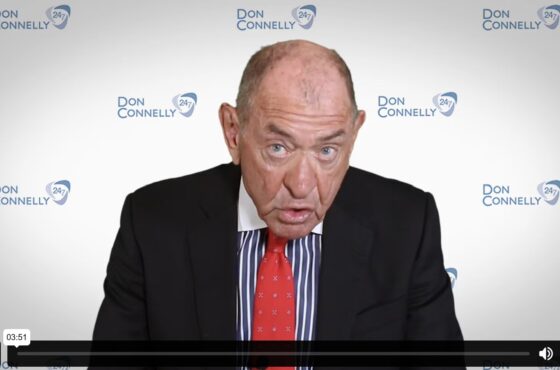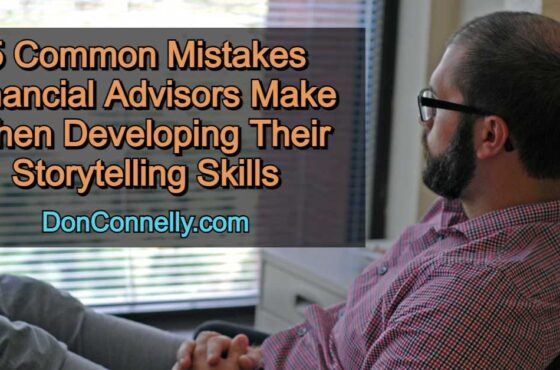The Importance of Your Storytelling Skills in Building Trust
 Now and then, financial advisors must be reminded that they are in a relationship business and that what they have as a clientele is a direct by-product of trust.
Now and then, financial advisors must be reminded that they are in a relationship business and that what they have as a clientele is a direct by-product of trust.
The cold hard reality is that people need to trust you before they will engage with you. Especially these days, people are almost instinctively cynical, overly careful to approach others they don’t know with a heavy dose of skepticism. So, when we want to connect with any group of people, our first task must be to break through their defensive shells so we can build trust. Without trust, there can be no connection, no relationship, and no channel through which vision and ideas can flow.
Most financial advisors understand the importance of communication. The good ones work on building an arsenal of great tools to help them effectively connect with their prospects and clients. However, one vital tool continues to be underutilized and undervalued: Storytelling.
The power of storytelling
Everyone loves a good story and, whether we realize it or not, we are all storytellers. Stories are how we reveal our humanity and share a part of ourselves that is not always apparent. It’s how we reinforce our shared values and beliefs so we can relate to one another. When we allow others to share their stories, it creates a bond based on appreciation and trust. Stories help us understand one another. They have the power to inspire compassion and change our attitudes.
At some point in our lives, we have all heard a story that struck a chord. In some cases, it changed our entire perspective about someone or something. Financial advisors face an uphill battle in this crowded and fractured field. Trust toward financial institutions has diminished over the last decade, and stories may be the underrated vehicle for changing perceptions and fostering connections on the way to building trust.
The science of storytelling
Stories and the way we react to them are part of our DNA. We’re programmed for stories. That becomes clear when you understand the neuroscientific effects of storytelling. According to research, when people hear stories, their brains light up the same areas of the brain that are only active when we actually experience something .
That’s why stories are memorable, while the regurgitation of facts, figures, and educational presentations are not. In essence, storytelling clears out our receptor channels, freeing them up for more meaningful communication.
Our natural predisposition for embracing stories, together with the connectedness they foster, makes it possible for two strangers to build a relationship.
Stories are a vehicle for empathy.
The shortest path to building trust is through empathy. With a well-crafted story, your prospects should be able to see themselves in the story. As the science shows, a story will tap into the same receptors in the brain as an actual experience. If you know enough about your prospects and their circumstances, your stories can create an empathic journey because they can relate to someone else’s physical experience. Nothing can build trust any faster.
Authenticity leads to trust.
Storytelling could boomerang if people suspect it’s false or disingenuous. You can embellish some facts to spin a more interesting story, but you must always be true to yourself—telling hard truths, even if it means revealing a shortcoming in your business. This is why I have always stressed that you frame your stories around you, such as the “Who I am story” and the “Why I’m here story” or the “Whom I’ve helped story.” Having a repertoire of these stories prepared, rehearsed and ready to tailor to the person in front of you gives you a powerful arsenal.
Storytelling is the most important soft skill you can ever learn.
You’ve probably met some people in your life who are natural storytellers. While they are to be envied, there’s no reason why anyone can’t acquire the same skill. Natural storytellers are good because they tell their stories over and over again. They’ve honed their stories to have the greatest impact when they tell them. They’re confident their story will elicit the same reaction each time they tell it.
Storytelling is a soft skill just like any other, which means it takes practice—lots and lots of practice—to have it sound natural, almost conversational. It’s critical to try your stories out on people—perhaps family and friends—to get feedback. Eventually, it will become second nature. That’s when you will experience the power of storytelling.
If you need help developing and honing your storytelling skills, watch this 2-minute video to learn how the Don Connelly 24/7 learning center can help!
We recommend the PLATINUM membership level for its best value for money. See membership benefits.



